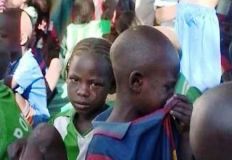French aid workers stand trial in Chad child case
December 21, 2007 (N’DJAMENA) — Six French aid workers accused of trying to kidnap 103 children stand trial in Chad on Friday, with widespread expectation of a diplomatic deal to send them home despite popular pressure for their punishment.
 The French citizens, members of a humanitarian group called Zoe’s Ark, were arrested in late October as they tried to fly the children, aged 1-10, out of eastern Chad to Europe.
The French citizens, members of a humanitarian group called Zoe’s Ark, were arrested in late October as they tried to fly the children, aged 1-10, out of eastern Chad to Europe.
President Idriss Deby’s government said they had no authorisation to take the infants out of the country. The six French deny the kidnapping and fraud charges against them and have been on hunger strike, refusing food but drinking water.
If convicted, they could face forced labour sentences, but many believe they will be allowed to serve jail terms in France under bilateral accords or benefit from a pardon from Deby.
Many Chadians resent what they see as foreign meddling in the case, in which French President Nicolas Sarkozy has taken a personal interest.
Sarkozy travelled to N’Djamena last month to secure the release of seven other foreigners and held talks with Deby on the Zoe’s Ark case at an EU-Africa summit last month.
“We are a sovereign state, despite our poverty, and the French people should respect us,” said Ahmat Yacoub, spokesman for the Supreme Court. “For our pride, our government’s pride, they should serve their sentences here if convicted.”
“There is politics disguised as law in this case.”
Three Chadians and a Sudanese national will also stand trial as accomplices in the dusty N’Djamena courtroom, which was given a last-minute clean on Thursday.
The case has embarrassed France, which supports Deby’s rule in landlocked, oil-producing Chad. It has troops stationed in its former colony and is providing the bulk of a European Union peacekeeping force to be deployed in east Chad in January.
The Zoe’s Ark workers deny any wrongdoing, saying they were on a humanitarian mission to save sick orphans from Sudan’s war-torn Darfur region for fostering in Europe.
But Chadian and U.N. officials say most of the children were not orphans, were generally in good health and came from settlements straddling the Chad-Sudan frontier.
(Reuters)
